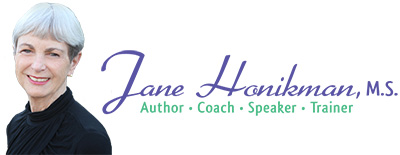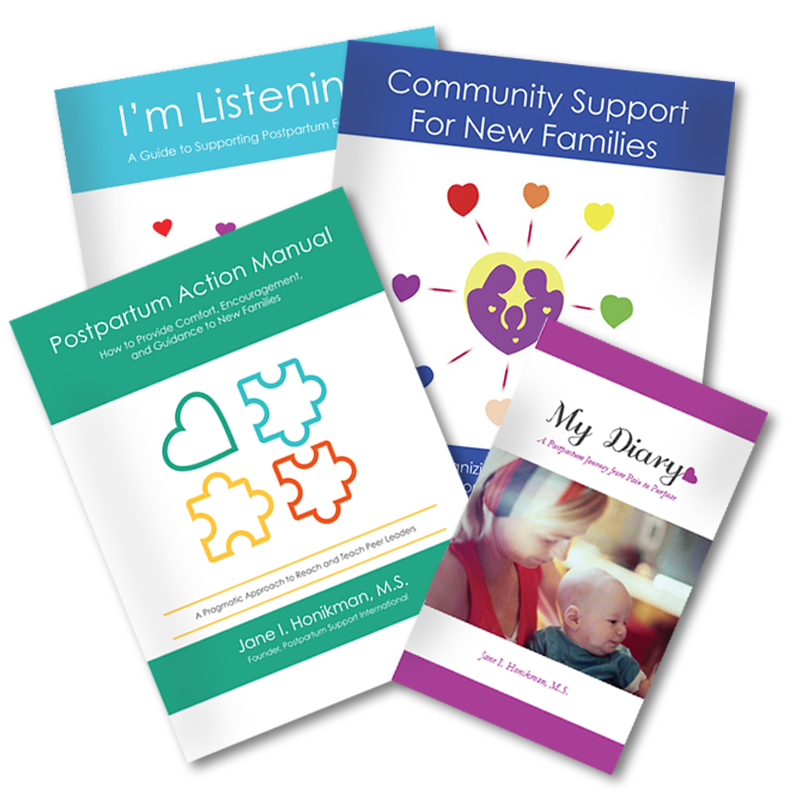By Jane I. Honikman, 1977
It was 2 AM and Stephen would not stop crying. He was four days old and creating an increasingly difficult situation for his unskilled, new parents. If only we could go back to the hospital, I wished, it was so organized and peaceful there. My attempts to calm him and my urgent desire for some sleep were being ruined by his incessant crying. In total frustration, I placed him on the floor next to the rocking chair (where we had been trying to act out the picture perfect mother-and-child scene) and I ran from his room in tears. I met his equally distraught father in the hallway and sobbed, “I don’t know what to do with him, you take care of him.:
“Is he sick, shall we call the doctor?”
“I don’t think so, besides, we can’t bother him at this hour.”
“Is he hungry?”
“I don’t know, I just nursed him.” And so it went.
It has been 51/2 years since we experienced that and many other similar scenes as first time parents. Somehow, through trial and error, crisis and pleasure, we managed to survive the new roles which we had created for ourselves. We discovered, to our dismay, that no matter how well planned our pregnancy had been, or how well we had prepared for childbirth, the onset of parenthood generated a wave of emotional ripples that we had not anticipated.
At times I wondered did it have to be this bad as I appeared all smiles on the outside and seethed with tension on the inside. Wasn’t anyone else feeling the same distress, pretending it was so simple when it was impossible? It took time for us to find other couples who were willing to admit that they too were having difficulties adjusting to their new roles and changed life styles. When we could talk about it we agreed that parenting required skills which were acquired through experience or training. The magical instinct that guided new parents turned out to be only a myth. Just as we had learned that the stork had not brought our babies, we had discovered that the bird of paradise could not help with their raising. But what could be done for other families? How could experienced couples help new parents?
This question kept challenging me. Fortunately, I met other parents who were also seeking an answer to this question. In January 1976, I helped in the formulation of a new community organization called Postpartum Education for Parents, or PEP. Our group was designed to carry on where childbirth education left off, with the arrival of the baby. The goal was to ease the adjustment of the developing family by providing emotional support through trained parent volunteers. We planned to offer two free services, a 24 hour, 7 day per week Warm Line and Parent Discussion Groups. The Warm Line would use an answering service to allow the volunteers to work from their own homes. The concept of a “warm” in contrast to a “hot” line was chosen to encourage a wide scope of calls. Our intent was to appear as nonthreatening as possible so that parents who could not call a stress line would feel comfortable with the PEP Warm Line. Whenever a medical or psychological program would arise the volunteers would be trained to refer the parent to a specific agency, a doctor, or other professional. Our objective was to provide nonjudgmental environments, on the phone or in a group setting, where parents could discuss their concerns and questions, both negative and positive, about parenthood. The sharing of ideas would increase the parent’s sense of confidence and allow them to make their own decisions regarding their families.
To begin with we needed to have the backing of the community, especially those in the health professions. Our first support came from the childbirth educators of Santa Barbara and then from the Santa Barbara Pediatric Society. In no way did we want to interfere with the medical profession, instead we wanted to assist the services which already existed. We impressed the child psychiatric at the Santa Barbara County Department of Mental Health and he secured the underwriting of our printing costs for up to $350. This gave us the necessary incentive to finish the writing of a Reference Guide designed to assist our volunteer in their training, and to create a PEP brochure. An advisory board was established with representatives from obstetrics-gynecology, pediatrics, psychology-counseling, OB nursing, childbirth education, and psychiatry. With their liaison into the community sectors from which they came, we were able to continue to build our reputation.
As of July 1, 1977, PEP is a reality and we have fourteen trained parent volunteers. The ideal volunteer is a parent who has an understanding of his or her own feelings and experiences relating to that role, be caring and able to relate to and communicate with other people. After completing a written application, the volunteer is interviewed and then attends two all day training sessions. These workshops are intended to provide the parents with the skills necessary for responding objectively and compassionately to Warm Line calls. We are able to offer the Warm Line because of a $500 Research and Projects Grant from the American Association of University Women’s Education Foundation. The type of phone calls we receive reflect the need for PEP. “What do you do with a non-participating father?” “My baby is two months old and seems unusually fuss.” “Is it common to feel less interested in sex while I’m nursing?” In response, we listen objectively, ask many questions, offer suggestions, and encourage the parents to consider the alternatives available to answer their questions. We make it clear that there are few concrete rules to follow. If there is the slightest hint of the need for medication or other assistance, we refer the parents to the proper source in Santa Barbara. A follow-up call is made within the next few days to offer further assistance and support. An invitation to attend a parents discussion group is always extended. Strict confidentiality is adhered to.
The success of our discussion groups is best summarized by a participant with a colicky baby who says, “I feel so much better knowing that other people are experiencing the same problem.” The diversity of the groups is dramatic; couples, single mothers, adoptive parents, and wives whose husbands don’t or won’t participate. But the common denominator of being a parent keeps the groups united. The wide range of experiences allows for a variety of suggestions and possible solutions to be voiced. This sharing of ideas provides the foundation of the PEP philosophy. There is no one right way to parent, but rather there are many approaches from which to choose. The key is for parents to feel good and comfortable about what they are doing. We meet in a volunteer’s home every three weeks in the morning and the evening. There is a set topic to keep the discussions flowing, but generally there is never enough time to begin to cover all that is on the parents’ minds. As with the Warm Line skills, volunteers are trained in the art of facilitating group discussions.
There is still a great deal which is waiting to be accomplished. We need more volunteers, especially fathers. We want to become part of the Spanish speaking community in Santa Barbara and, although the initial contacts have been made, all the work is still before us. There are legal technicalities which must be attended to, such as obtaining non-profit status. And there is always the matter of funding. Although this is an organization run on a low budget, and the energies of volunteers, we must have some money to cover the answering service and pay for printing costs. At no time do we want to charge for our services. It is the “for parents, by parents” image which makes us unique, especially to the medical community. Another service we intend to offer parents is that of one-to-one or group support for special circumstances such as caesarean section births, adoptive families, birth defects, belated parenthood, premature baby, single parenthood, and infant-parent separation. Only parent volunteers who have experienced a special circumstance will be qualified to assist others.
The satisfaction I feel from helping to organize PEP is deep. My own personal growth from the experience is the result of learning to formulate my ideas, define plans, and follow them through to a successful conclusion. Meeting and presenting PEP to the community gives me a new sense of self confidence, and the researching and writing of papers and letters allows me to further my education beyond the walls of an institution. To know that my past frustrations and sense of isolation are easing some of that for other new parents is tremendous. If PEP can play a part in the growth and development of today’s parents, then we will all benefit. Our society has neglected its future for too long by not preparing its young people for the most common, unskilled job of all – parenting. Since on-the-job experiences seems to be the only training currently available, then emotional support will make this important job seem easier, or at least less lonely. My memories of the onset of parenthood are vivid as I respond to a tired parent’s call. “Yes, I know exactly what you must be feeling right now, let’s talk about it.”


